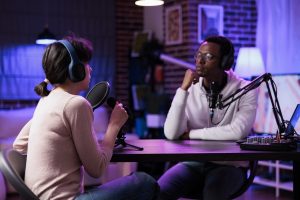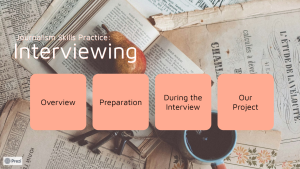41 Interviewing
Learning Objectives
-
Learn about primary vs secondary sources and practice one of the most important skills in journalism: the interview.
-
Cite specific textual evidence to support inferences and conclusions drawn from the text.
Chapter & Discussion
This chapter includes a presentation that can be navigated in a classroom setting or independently. You can access the presentation via the link below.
Journalism Skills Practice: Interviewing
Work through the different sections of the chapter and discuss ideas and topics as they arise. If you’re working independently, take notes instead. Notes and active discussion will be helpful in navigating this week’s assignments.
Overview
Interviews are one of the most credible sources you can get for a story because the information comes directly from a primary source (someone who is directly part of the story or impacted by the story).
This is one of the reasons we trust journalists: because their sources are real people who have something to do with the story. Interviews can deliver:
- Direct quotes from people close to the story
- Perspectives of people affected by the story
- Facts of the case that aren’t yet known
Today, we’ll talk about interviews and practice using this tool to help us figure out what’s happening in the world.
Preparation
Before you interview, you should know about the person and be ready to lead them in a conversation. Research on who they are and their expertise are essential. Also, the audience needs to know their background and why they’re an expert on this.
Preparing a list of questions beforehand is an important part of the process. You should have an idea of what your story is and how this person is a primary source. Your questions should be designed to get facts from this person.
However, it is still a conversation. Be ready for things to change!

During the Interview
We never really know where a conversation will lead. Remember that you are talking to a real person who has agreed to be a source for your story. Know what you’re looking for and try to guide the conversation there.
However, it is essential that you listen. If you stick too hard to your script, they will not feel like they’re in a conversation, and you won’t get the best content.
When someone says something worth investigating, make sure you do so. Ask follow-up questions and try to get at the heart of your story.
Assigned Reading
Here are this week’s readings. Additionally, please read for your own personal enjoyment for 1/2 hour each day. This will be called your “Reading Zone” reading and it will coincide with many upcoming activities.
Interviewing Essentials: Top Tips (via BBC Academy)
Assignment: Expert Interview (250 Words)
The goal of this project is to better understand how journalists use interviews to get primary sources for their stories.
1. Find an expert on something: some one who, because of training, education, or experience, has special knowledge of a subject beyond that of the average person.
2. Come up with four questions for your expert that you think will result in interesting answers.
3. Interview your expert. Provide a transcript or recording of your interview.
4. In a short paragraph, tell me what you learned.
Assignment: Reading Zone Response (250 Words)
For Reading Zone, you must find a novel that is interesting to you and enjoyable to read. If you need help finding a Reading Zone book, please ask. Please read your Reading Zone book for a half-hour each day. On class days, there will be time in class dedicated to reading.
Create a two-paragraph response to the reading you did this week. The first paragraph should summarize what you read this week. The second paragraph should address the following prompt:
If you were to write a novel, what would it be about? Would it be anything like the book you’re reading? How would your style be different?
Attribution
British Broadcasting Corporation (2024). BBC Academy: Learning Resources for Journalism Students.


